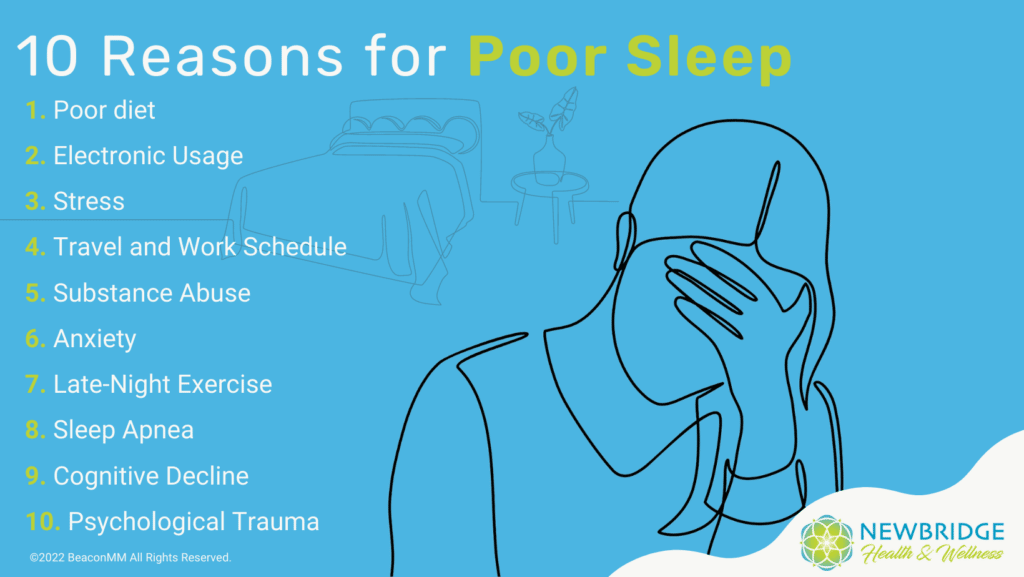Have you ever woken up in the morning feeling like a complete zombie? Or perhaps throughout the entire night, you managed to get a total of 10 minutes of sleep – or at least that’s how it felt. Well, the fact is, millions of people toss and turn each night and can’t seem to get quality sleep. And this can be attributed to several causes.
Over time, sleep deprivation can lead to serious health conditions. You can become less focused, moody, and you may even feel as if your waking life is more like a dream than a reality. But if you want to start getting proper rest and feeling refreshed again, understanding why you’re not sleeping well is the first step in correcting the problem.
Insomnia and poor sleep can make life challenging. And here, we’ll explore 10 reasons why you may be getting inadequate sleep.
Could you benefit from getting a better night’s sleep? Reach out to the functional medicine experts at Newbridge Health & Wellness and schedule a visit today.
Do I Have Insomnia?
What exactly is insomnia? Well, it’s actually a common sleep disorder that affects as many as two-thirds of adults in America according to data from the American Sleep Association.
Insomnia is defined as a sleep disorder in which you’re not able to fall asleep or stay asleep at night. And this condition can be either acute or chronic. Basically, if your bout of insomnia lasts for only a night or two up to a few weeks, this is considered short-term or acute insomnia. However, chronic insomnia is defined as lasting at least a few nights a week and occurring for at least three months or longer.
There are also two main categories of insomnia – primary and secondary.
Primary Insomnia
Primary insomnia isn’t typically linked to any underlying health condition and is often caused by:
- Stress
- Noise
- Light
- Temperature
- Changes to your sleep schedule.
This condition can also be associated with genetic predisposition as some research suggests that some genes may increase a person’s risk for insomnia.
Secondary Insomnia
Secondary insomnia may be the result of mental health issues or a health condition such as arthritis, heartburn, asthma, or from several other health conditions. Secondary insomnia may also be a result of the following:
- Cancer
- Hyperthyroidism
- Pain from injuries
- Medications
- Substance abuse
- Caffeine
- ADHD
- Alzheimer’s
- Pregnancy
- PMS
- Menopause
When it comes to determining the underlying health conditions that may be causing your lack of sleep, consulting with a sleep specialist or functional medicine practitioner may be an ideal first step.
10 Reasons Why You’re Not Sleeping at Night

Have you ever stopped and wondered, why can’t I sleep at night? Believe it or not, you’re not alone. The fact is there are literally millions of other adults tossing and turning at night for a variety of reasons.
1. Poor Diet
Nutrition can affect your mental health. And a poor diet can not only be linked to a variety of health issues, it can also be a primary cause of insomnia. In fact, according to a 2019 study, if you’re consuming a diet high in refined carbohydrates, this can increase your chances of developing insomnia.
Spikes in blood sugar levels are often caused by eating a high-carb diet such as white bread, cake, cookies, and even soda to name a few. And this peak and crash of blood sugar levels could be responsible for insomnia.
2. Electronic Usage
It’s no secret that we’re more “plugged in” than ever before in this modern digital era. But even with the convenience and benefits of being connected, spending too much time on digital devices can make it difficult to fall asleep.
The screens on our devices emit blue light which restricts the production of melatonin – the hormone that helps control your circadian rhythm (sleep cycle). And the longer you spend staring at your device – especially late at night – the harder it is to fall asleep, stay asleep, and wake up the next day.
3. Stress
Considered a factor that contributes to primary insomnia, chronic stress can make it difficult for your brain to “shut down” at night. Additionally, stress causes physiological changes to occur within the body such as:
- Muscle tension
- Erratic breathing
- Indigestion
- Heartburn
- High blood pressure
- Chest pain
All of the above conditions can cause you to get a poor night’s sleep. But these conditions may also be directly related to present stressors in your life.
4. Travel or Work Schedule
When it comes to getting quality sleep, keeping a routine for when you go to bed at night can be extremely helpful. But whenever you deviate from this routine, it can cause a disruption in your ability to fall asleep – and stay asleep.
For example, traveling overnight can throw off your sleep patterns. And so can working too late. Basically, going to bed at different times every night will disrupt your body’s natural sleep cycle, and it may take days or weeks to return to normal.
5. Substance Abuse
Many people rely on substances like alcohol to fall asleep at night. But alcohol and other substances impede your body’s ability to reach REM sleep, which is what the body (and your brain) needs to get quality rest and recharge.
Long-term substance abuse can also cause you to develop insomnia if you abruptly stop using the substances. And it may take several weeks or months to return to a natural sleep pattern.
6. Anxiety
When your anxiety levels are high, this can cause your brain to work overtime. You may even lie awake in bed thinking about how to solve a problem in your life or replaying the day’s events in your mind. And this will only keep you awake.
Key psychological signs attributed to anxiety such as a persistent sense of worry or dread can make it difficult for your body to relax and fall asleep. In this situation, reading or focusing on your breathing may help reduce anxiety and allow you to fall asleep.
7. Late-Night Exercise
With the prevalence of 24-hour fitness centers and atypical work schedules, many people choose to exercise in the evening hours. And though exercise is great for the body, increasing your heart rate by exercising late at night can make it difficult to fall asleep.
When you exercise, your body also releases endorphins which can improve mood and reduce anxiety. But these hormones also excite pleasure centers in the brain and may make it difficult for you to fall asleep if your endorphin levels increase late at night.
8. Sleep Apnea
Sleep apnea is a sleep disorder identified by breathing disruptions throughout the night. And this can be either mild or severe.
If you have sleep apnea, seeking treatment for your condition through the use of devices or medications may be an ideal solution. And seeking the guidance of a sleep specialist or functional medicine practitioner is also highly recommended.
9. Cognitive Decline
People with cognitive decline such as Dementia or Alzheimer’s disease often experience changes in their sleep schedule.
Though scientists do not fully understand why this occurs, it is believed that changes in the brain also alter sleep patterns and one’s ability to fall asleep as cells and tissue in the brain deteriorate.
10. Psychological Trauma
Any type of traumatic event can cause a disruption in your sleep pattern. Just as with physical trauma resulting in pain that makes it difficult to fall asleep, traumatic psychological events such as a death in the family, experiencing abuse, or witnessing a crime can cause PTSD – and this can make it difficult to relax the mind and fall asleep.
Psychological trauma can last for several months or even years. As such, treatment or therapy for this condition may be necessary to cope and return to normal sleep patterns.
Treating Insomnia With Functional Medicine
When determining the cause of insomnia or the inability to fall asleep consistently, functional medicine focuses on the underlying issues that may be responsible for the condition. Through a holistic and science-based approach, a functional medicine practitioner will look at every possible cause and determine the best course of action for correcting your sleep problem.
Functional medicine may also recommend nutritional treatment plans, as well as exercise or lifestyle modifications in order for you to attain a better quality of sleep.
Are you ready to get a better night’s rest? Contact the functional medicine experts at Newbridge Health & Wellness and schedule a visit today.


